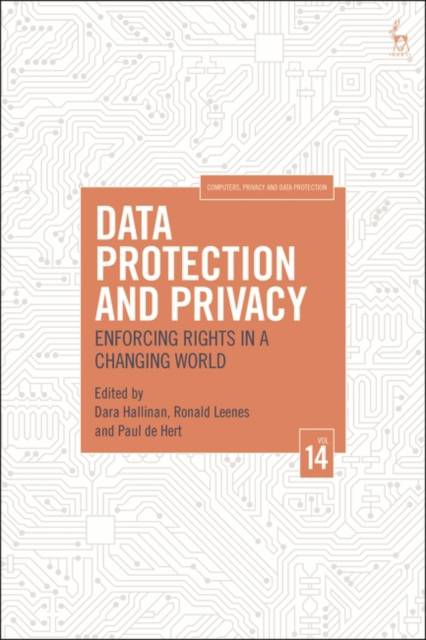
- Retrait gratuit dans votre magasin Club
- 7.000.000 titres dans notre catalogue
- Payer en toute sécurité
- Toujours un magasin près de chez vous
- Retrait gratuit dans votre magasin Club
- 7.000.0000 titres dans notre catalogue
- Payer en toute sécurité
- Toujours un magasin près de chez vous
Data Protection and Privacy, Volume 14
Enforcing Rights in a Changing World
64,45 €
+ 128 points
Description
This book brings together papers that offer conceptual analyses, highlight issues, propose solutions, and discuss practices regarding privacy, data protection and enforcing rights in a changing world. It is one of the results of the 14th annual International Conference on Computers, Privacy and Data Protection (CPDP), which took place online in January 2021.
The pandemic has produced deep and ongoing changes in how, when, why, and the media through which, we interact. Many of these changes correspond to new approaches in the collection and use of our data - new in terms of scale, form, and purpose. This raises difficult questions as to which rights we have, and should have, in relation to such novel forms of data processing, the degree to which these rights should be balanced against other poignant social interests, and how these rights should be enforced in light of the fluidity and uncertainty of circumstances.
The book covers a range of topics, such as: digital sovereignty; art and algorithmic accountability; multistakeholderism in the Brazilian General Data Protection law; expectations of privacy and the European Court of Human Rights; the function of explanations; DPIAs and smart cities; and of course, EU data protection law and the pandemic - including chapters on scientific research and on the EU Digital COVID Certificate framework.
This interdisciplinary book has been written at a time when the scale and impact of data processing on society - on individuals as well as on social systems - is becoming ever starker. It discusses open issues as well as daring and prospective approaches and is an insightful resource for readers with an interest in computers, privacy and data protection.
The pandemic has produced deep and ongoing changes in how, when, why, and the media through which, we interact. Many of these changes correspond to new approaches in the collection and use of our data - new in terms of scale, form, and purpose. This raises difficult questions as to which rights we have, and should have, in relation to such novel forms of data processing, the degree to which these rights should be balanced against other poignant social interests, and how these rights should be enforced in light of the fluidity and uncertainty of circumstances.
The book covers a range of topics, such as: digital sovereignty; art and algorithmic accountability; multistakeholderism in the Brazilian General Data Protection law; expectations of privacy and the European Court of Human Rights; the function of explanations; DPIAs and smart cities; and of course, EU data protection law and the pandemic - including chapters on scientific research and on the EU Digital COVID Certificate framework.
This interdisciplinary book has been written at a time when the scale and impact of data processing on society - on individuals as well as on social systems - is becoming ever starker. It discusses open issues as well as daring and prospective approaches and is an insightful resource for readers with an interest in computers, privacy and data protection.
Spécifications
Parties prenantes
- Editeur:
Contenu
- Nombre de pages :
- 336
- Langue:
- Anglais
- Collection :
Caractéristiques
- EAN:
- 9781509954551
- Date de parution :
- 15-06-23
- Format:
- Livre broché
- Format numérique:
- Trade paperback (VS)
- Dimensions :
- 156 mm x 234 mm
- Poids :
- 439 g

Les avis
Nous publions uniquement les avis qui respectent les conditions requises. Consultez nos conditions pour les avis.





